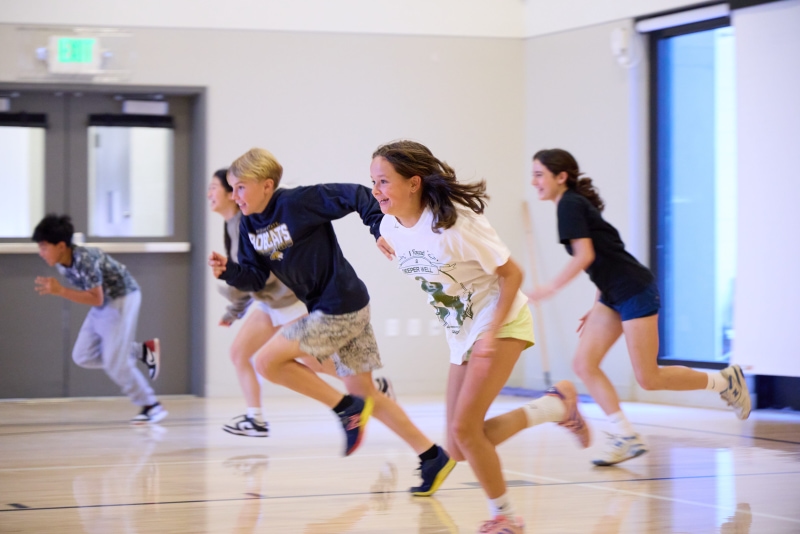Health & Wellness
Students experience joy through physical and social activity, build character through competition and conflict resolution, and develop a life-long appreciation of fitness and wellness. The youngest students build a foundation of cooperation, taking turns, solving problems, and gross motor skills. As students progress through middle school, they engage in increasingly complex competitive and cooperative games, team sports, physical fitness challenges, and peer coaching.
Preschool
The foundational elements of health and wellness are introduced through play-based activities. Children engage in activities that promote gross motor skills, such as running, jumping, and throwing. They practice social interaction through cooperative games, learning turn-taking and sharing. Basic body awareness is explored through movement and song. The concept of listening and following directions, vital for developing listening skills and cooperation in group settings, are taught through simple instructions and encouragement.

Kindergarten
Kindergarteners focus on developing motor skills and basic movement patterns. Students learn the importance of cooperation and teamwork through group activities and games. Spatial awareness is emphasized, helping children understand their place in space and how to move safely. The concepts of taking turns and sharing are introduced, fostering positive social interactions. Students practice listening to multi-layered instructions, improving their ability to follow directions and participate effectively in group activities. These foundational skills prepare students for more complex activities and teamwork in later grades.

1st Grade
Students build on foundational movement patterns and motor skills, developing hand-eye coordination through activities like juggling and catching. Team-building exercises help students learn to work together and support one another; additionally, supportive language is taught, promoting a positive and encouraging environment. Students further develop their throwing and catching skills. These activities help students gain confidence in their physical abilities and develop important social skills.

2nd Grade
The emphasis on movement patterns helps students refine their motor skills and improve coordination. Social behavior that respects both self and others is a key focus, fostering a positive and inclusive environment. Students perform designed rhythmic behaviors, developing their sense of rhythm and coordination. The value of rules in activities is also explored, teaching students the importance of following guidelines and fair play.

3rd Grade
Students begin to define, practice, and model good sportsmanship through the introduction of team sports and games. Knowledge of health and physical fitness is incorporated, helping students understand the importance of a healthy lifestyle. Students refine and implement their skills toward developing strategies in competitive play. Team sports include volleyball, basketball, lacrosse, soccer, tee-ball, and kickball, providing a variety of activities for students to explore.

4th Grade
Students are introduced to physical fitness challenges, pushing them to set goals and recognize personal growth. Team sports and games remain a core component, alongside group communication skills. Circuit training, paced running, and building upper-body strength are introduced, improving overall fitness. Team sports include volleyball, basketball, lacrosse, soccer, tee-ball, kickball, football, handball, tennis, and futsal, offering a diverse range of activities.

5th Grade
Students focus on leadership exploration and physical fitness challenges. Positive social interactions and self-expression are encouraged. Students develop strategies for team sports and games, further refining their skills. Communication and peer coaching are emphasized, helping students learn to work collaboratively and support one another. Team sports include volleyball, basketball, lacrosse, soccer, tee-ball, ultimate frisbee, European handball, football, tennis, and futsal.

6th Grade
Students establish commonalities as a community through collaboration and sportsmanship. Sport fundamentals and rules are introduced with assessments through tests. Practice tasks and small-sided games help students develop their skills. Hand-eye coordination, spatial awareness, and fitness (understanding various muscle groups) are key focuses. Students participate in quarterly test runs and are encouraged to make positive contributions towards self and others.

7th Grade
Students build on sport unit rules and fundamentals, including written tests, understanding sport strategy, and small-sided competitions with defense. Fitness activities include reaction, speed, and agility exercises, with quarterly test runs. Teamwork is emphasized, focusing on how individual output affects others. These activities prepare students for more advanced sports and fitness activities in later grades.

8th Grade
Students focus on demonstrating and testing knowledge of sport unit fundamentals and rules. Small and full-sided competitions are conducted. Fitness training includes high-intensity interval training, bodyweight lifts, and quarterly test runs. Teamwork, self-reflection on individual team roles, understanding leadership, and understanding intentions to compete are emphasized, preparing students for more advanced fitness and teamwork environments.

Preschool
The foundational elements of health and wellness are introduced through play-based activities. Children engage in activities that promote gross motor skills, such as running, jumping, and throwing. They practice social interaction through cooperative games, learning turn-taking and sharing. Basic body awareness is explored through movement and song. The concept of listening and following directions, vital for developing listening skills and cooperation in group settings, are taught through simple instructions and encouragement.

Kindergarten
Kindergarteners focus on developing motor skills and basic movement patterns. Students learn the importance of cooperation and teamwork through group activities and games. Spatial awareness is emphasized, helping children understand their place in space and how to move safely. The concepts of taking turns and sharing are introduced, fostering positive social interactions. Students practice listening to multi-layered instructions, improving their ability to follow directions and participate effectively in group activities. These foundational skills prepare students for more complex activities and teamwork in later grades.

1st Grade
Students build on foundational movement patterns and motor skills, developing hand-eye coordination through activities like juggling and catching. Team-building exercises help students learn to work together and support one another; additionally, supportive language is taught, promoting a positive and encouraging environment. Students further develop their throwing and catching skills. These activities help students gain confidence in their physical abilities and develop important social skills.

2nd Grade
The emphasis on movement patterns helps students refine their motor skills and improve coordination. Social behavior that respects both self and others is a key focus, fostering a positive and inclusive environment. Students perform designed rhythmic behaviors, developing their sense of rhythm and coordination. The value of rules in activities is also explored, teaching students the importance of following guidelines and fair play.

3rd Grade
Students begin to define, practice, and model good sportsmanship through the introduction of team sports and games. Knowledge of health and physical fitness is incorporated, helping students understand the importance of a healthy lifestyle. Students refine and implement their skills toward developing strategies in competitive play. Team sports include volleyball, basketball, lacrosse, soccer, tee-ball, and kickball, providing a variety of activities for students to explore.

4th Grade
Students are introduced to physical fitness challenges, pushing them to set goals and recognize personal growth. Team sports and games remain a core component, alongside group communication skills. Circuit training, paced running, and building upper-body strength are introduced, improving overall fitness. Team sports include volleyball, basketball, lacrosse, soccer, tee-ball, kickball, football, handball, tennis, and futsal, offering a diverse range of activities.

5th Grade
Students focus on leadership exploration and physical fitness challenges. Positive social interactions and self-expression are encouraged. Students develop strategies for team sports and games, further refining their skills. Communication and peer coaching are emphasized, helping students learn to work collaboratively and support one another. Team sports include volleyball, basketball, lacrosse, soccer, tee-ball, ultimate frisbee, European handball, football, tennis, and futsal.

6th Grade
Students establish commonalities as a community through collaboration and sportsmanship. Sport fundamentals and rules are introduced with assessments through tests. Practice tasks and small-sided games help students develop their skills. Hand-eye coordination, spatial awareness, and fitness (understanding various muscle groups) are key focuses. Students participate in quarterly test runs and are encouraged to make positive contributions towards self and others.

7th Grade
Students build on sport unit rules and fundamentals, including written tests, understanding sport strategy, and small-sided competitions with defense. Fitness activities include reaction, speed, and agility exercises, with quarterly test runs. Teamwork is emphasized, focusing on how individual output affects others. These activities prepare students for more advanced sports and fitness activities in later grades.

8th Grade
Students focus on demonstrating and testing knowledge of sport unit fundamentals and rules. Small and full-sided competitions are conducted. Fitness training includes high-intensity interval training, bodyweight lifts, and quarterly test runs. Teamwork, self-reflection on individual team roles, understanding leadership, and understanding intentions to compete are emphasized, preparing students for more advanced fitness and teamwork environments.




